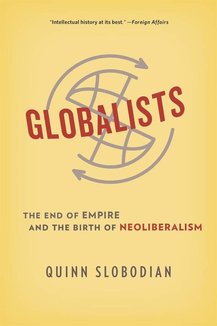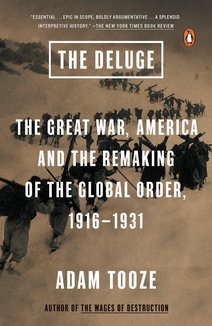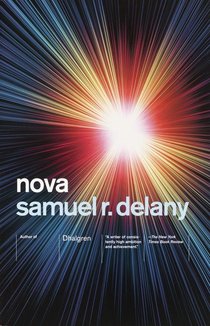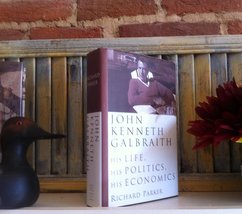Recommended Books

Globalists: The End of Empire and the Birth of Neoliberalism
Author:
Quinn Slobodian
ISBN 13:
978-0674244849
George Louis Beer Prize Winner Wallace K. Ferguson Prize Finalist A Marginal Revolution Book of the Year “A groundbreaking contribution…Intellectual history at its best.” ―Stephen Wertheim, Foreign Affairs Neoliberals hate the state. Or do they? In the first intellectual history of neoliberal globalism, Quinn Slobodian follows a group of thinkers from the ashes of the Habsburg Empire to the creation of the World Trade Organization to show that neoliberalism emerged less to shrink government and abolish regulations than to redeploy them at a global level. It was a project that changed the world, but was also undermined time and again by the relentless change and social injustice that accompanied it. “Slobodian’s lucidly written intellectual history traces the ideas of a group of Western thinkers who sought to create, against a backdrop of anarchy, globally applicable economic rules. Their attempt, it turns out, succeeded all too well.” ―Pankaj Mishra, Bloomberg Opinion “Fascinating, innovative…Slobodian has underlined the profound conservatism of the first generation of neoliberals and their fundamental hostility to democracy.” ―Adam Tooze, Dissent “The definitive history of neoliberalism as a political project.” ― Boston Review
Find on:
 Amazon
Amazon

The Deluge: The Great War, America and the Remaking of the Global Order, 1916-1931
Author:
Adam Tooze
ISBN 13:
978-0143127970
A searing and highly original analysis of the First World War and its anguished aftermath—from the prizewinning economist and author of Shutdown , Crashed and The Wages of Destruction Winner of the Los Angeles Times Book Prize - History Finalist for the Kirkus Prize - Nonfiction In the depths of the Great War, with millions dead and no imaginable end to the conflict, societies around the world began to buckle. The heart of the financial system shifted from London to New York. The infinite demands for men and matériel reached into countries far from the front. The strain of the war ravaged all economic and political assumptions, bringing unheard-of changes in the social and industrialorder. A century after the outbreak of fighting, Adam Tooze revisits this seismic moment in history, challenging the existing narrative of the war, its peace, and its aftereffects. From the day the United States enters the war in 1917 to the precipice of global financial ruin, Tooze delineates the world remade by American economic and military power. Tracing the ways in which countries came to terms with America’s centrality—including the slide into fascism— The Deluge is a chilling work of great originality that will fundamentally change how we view the legacy of World War I.

Nova
Author:
Samuel R. Delany
ISBN 13:
978-0375706707
Given that the suns of Draco stretch almost sixteen light years from end to end, it stands to reason that the cost of transportation is the most important factor of the 32nd century. And since Illyrion is the element most needed for space travel, Lorq von Ray is plenty willing to fly through the core of a recently imploded sun in order to obtain seven tons of it. The potential for profit is so great that Lorq has little difficulty cobbling together an alluring crew that includes a gypsy musician and a moon-obsessed scholar interested in the ancient art of writing a novel. What the crew doesn’t know, though, is that Lorq’s quest is actually fueled by a private revenge so consuming that he’ll stop at nothing to achieve it. In the grandest manner of speculative fiction, Nova is a wise and witty classic that casts a fascinating new light on some of humanity’s oldest truths and enduring myths.

John Kenneth Galbraith: His Life, His Politics, His Economics
Author:
Richard Parker
ISBN 13:
978-0374281687
The life and times of America’s most celebrated economist, assessing his lessons—and warnings—for us today John Kenneth Galbraith’s books—among them The Affluent Society and American Capitalism —are famous for good reason. Written by a scholar renowned for energetic political engagement and irrepressible wit, they are models of provocative good sense that warn prophetically of the dangers of deregulated markets, war in Asia, corporate greed, and stock-market bubbles. Galbraith’s work has also deeply—and controversially—influenced his own profession, and in Richard Parker’s hands his biography becomes a vital reinterpretation of American economics and public policy. Born and raised on a small Canadian farm, Galbraith began teaching at Harvard during the Depression. He was FDR’s “price czar” during the war and then a senior editor of Fortune before returning to Harvard and to fame as a bestselling writer. Parker shows how, from his early championing of Keynes to his acerbic analysis of America’s “private wealth and public squalor,” Galbraith regularly challenged prevailing theories and policies. And his account of Galbraith’s remarkable friendship with John F. Kennedy, whom he served as a close advisor while ambassador to India, is especially relevant for its analysis of the intense, dynamic debates that economists and politicians can have over how America should manage its wealth and power. This masterful chronicle gives color, depth, and meaning to the record of an extraordinary life.